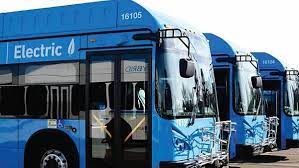As Nigeria joins the global community in commemorating World Sustainable Transport Day, it is a poignant moment for reflection on the critical role that transportation plays in the nation’s development and its impact on the environment. In a country where bustling urban centers and expanding populations characterise the landscape, the need for sustainable transport solutions has never been more urgent.
Nigeria, like many nations, faces the dual challenge of rapid urbanization and environmental sustainability. The bustling cities, with their traffic-choked streets and reliance on conventional fuel sources, contribute significantly to air pollution and carbon emissions. World Sustainable Transport Day serves as a beacon, guiding the nation towards a future where mobility aligns harmoniously with environmental preservation.
One of the primary facets of sustainable transport in Nigeria involves addressing the environmental toll of traditional fuel-dependent vehicles. Electric vehicles (EVs) represent a promising avenue for reducing the carbon footprint of transportation. The government and private sector should collaborate to incentivize the adoption of EVs, ensuring that charging infrastructure is accessible and that consumers are encouraged to make eco-friendly choices.
Public transportation is another critical area that demands sustainable solutions. Investing in efficient, affordable, and eco-friendly mass transit systems can significantly alleviate congestion, reduce emissions, and improve air quality. Initiatives such as dedicated bus lanes expanded and modernised rail networks, and well-planned urban development can contribute to a more sustainable and inclusive transport system.
Bolstering non-motorised modes of transport is equally vital. Nigeria can take inspiration from global examples where cycling and pedestrian-friendly infrastructure have been successfully integrated into urban planning. Creating safe cycling lanes, walkable pathways, and encouraging last-mile connectivity can promote healthier lifestyles, reduce traffic congestion, and enhance overall urban livability.
In addition to addressing environmental concerns, sustainable transport in Nigeria holds the key to fostering social equity. A well-designed public transportation system ensures that mobility is not a privilege exclusive to certain socioeconomic groups. Initiatives that prioritise accessibility and affordability can bridge gaps in urban-rural connectivity, enhancing social inclusivity and ensuring that the benefits of sustainable transport are shared by all.
While we celebrate World Sustainable Transport Day, it is crucial to recognise the collective responsibility shared by government, businesses, and individuals in driving change.Governments can play a pivotal role by formulating and implementing policies that incentivize sustainable transport practices. The private sector, including the burgeoning tech industry, can contribute by investing in innovative solutions such as ride-sharing platforms and green technology for public transportation.
Education and awareness campaigns are fundamental components of fostering a sustainable transport culture. Initiatives that inform citizens about the environmental impact of their transportation choices and promote the benefits of sustainable alternatives are essential for driving behavioral change.
World Sustainable Transport Day serves as a catalyst for Nigeria to reassess its transportation landscape and commit to a greener, more sustainable future. By embracing innovative solutions, investing in eco-friendly infrastructure, and fostering a culture of sustainability, Nigeria can navigate towards a future where transportation is not only efficient but also aligned with the principles of environmental stewardship and social inclusivity. It is time for Nigeria to pave the way for sustainable transport, steering the nation towards a brighter, cleaner future.





